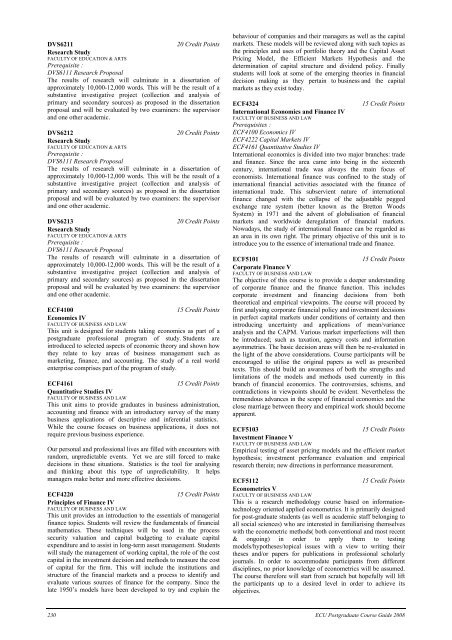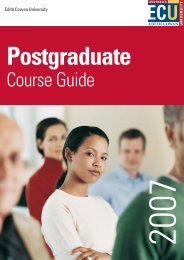Postgraduate - Edith Cowan University
Postgraduate - Edith Cowan University
Postgraduate - Edith Cowan University
Create successful ePaper yourself
Turn your PDF publications into a flip-book with our unique Google optimized e-Paper software.
DVS6211 20 Credit Points<br />
Research Study<br />
FACULTY OF EDUCATION & ARTS<br />
Prerequisite :<br />
DVS6111 Research Proposal<br />
The results of research will culminate in a dissertation of<br />
approximately 10,000-12,000 words. This will be the result of a<br />
substantive investigative project (collection and analysis of<br />
primary and secondary sources) as proposed in the dissertation<br />
proposal and will be evaluated by two examiners: the supervisor<br />
and one other academic.<br />
DVS6212 20 Credit Points<br />
Research Study<br />
FACULTY OF EDUCATION & ARTS<br />
Prerequisite :<br />
DVS6111 Research Proposal<br />
The results of research will culminate in a dissertation of<br />
approximately 10,000-12,000 words. This will be the result of a<br />
substantive investigative project (collection and analysis of<br />
primary and secondary sources) as proposed in the dissertation<br />
proposal and will be evaluated by two examiners: the supervisor<br />
and one other academic.<br />
DVS6213 20 Credit Points<br />
Research Study<br />
FACULTY OF EDUCATION & ARTS<br />
Prerequisite :<br />
DVS6111 Research Proposal<br />
The results of research will culminate in a dissertation of<br />
approximately 10,000-12,000 words. This will be the result of a<br />
substantive investigative project (collection and analysis of<br />
primary and secondary sources) as proposed in the dissertation<br />
proposal and will be evaluated by two examiners: the supervisor<br />
and one other academic.<br />
ECF4100 15 Credit Points<br />
Economics IV<br />
FACULTY OF BUSINESS AND LAW<br />
This unit is designed for students taking economics as part of a<br />
postgraduate professional program of study. Students are<br />
introduced to selected aspects of economic theory and shown how<br />
they relate to key areas of business management such as<br />
marketing, finance, and accounting. The study of a real world<br />
enterprise comprises part of the program of study.<br />
ECF4161 15 Credit Points<br />
Quantitative Studies IV<br />
FACULTY OF BUSINESS AND LAW<br />
This unit aims to provide graduates in business administration,<br />
accounting and finance with an introductory survey of the many<br />
business applications of descriptive and inferential statistics.<br />
While the course focuses on business applications, it does not<br />
require previous business experience.<br />
Our personal and professional lives are filled with encounters with<br />
random, unpredictable events. Yet we are still forced to make<br />
decisions in these situations. Statistics is the tool for analysing<br />
and thinking about this type of unpredictability. It helps<br />
managers make better and more effective decisions.<br />
ECF4220 15 Credit Points<br />
Principles of Finance IV<br />
FACULTY OF BUSINESS AND LAW<br />
This unit provides an introduction to the essentials of managerial<br />
finance topics. Students will review the fundamentals of financial<br />
mathematics. These techniques will be used in the process<br />
security valuation and capital budgeting to evaluate capital<br />
expenditure and to assist in long-term asset management. Students<br />
will study the management of working capital, the role of the cost<br />
capital in the investment decision and methods to measure the cost<br />
of capital for the firm. This will include the institutions and<br />
structure of the financial markets and a process to identify and<br />
evaluate various sources of finance for the company. Since the<br />
late 1950’s models have been developed to try and explain the<br />
behaviour of companies and their managers as well as the capital<br />
markets. These models will be reviewed along with such topics as<br />
the principles and uses of portfolio theory and the Capital Asset<br />
Pricing Model, the Efficient Markets Hypothesis and the<br />
determination of capital structure and dividend policy. Finally<br />
students will look at some of the emerging theories in financial<br />
decision making as they pertain to business and the capital<br />
markets as they exist today.<br />
ECF4324 15 Credit Points<br />
International Economics and Finance IV<br />
FACULTY OF BUSINESS AND LAW<br />
Prerequisites :<br />
ECF4100 Economics IV<br />
ECF4222 Capital Markets IV<br />
ECF4161 Quantitative Studies IV<br />
International economics is divided into two major branches: trade<br />
and finance. Since the area came into being in the sixteenth<br />
century, international trade was always the main focus of<br />
economists. International finance was confined to the study of<br />
international financial activities associated with the finance of<br />
international trade. This subservient nature of international<br />
finance changed with the collapse of the adjustable pegged<br />
exchange rate system (better known as the Bretton Woods<br />
System) in 1971 and the advent of globalisation of financial<br />
markets and worldwide deregulation of financial markets.<br />
Nowadays, the study of international finance can be regarded as<br />
an area in its own right. The primary objective of this unit is to<br />
introduce you to the essence of international trade and finance.<br />
ECF5101 15 Credit Points<br />
Corporate Finance V<br />
FACULTY OF BUSINESS AND LAW<br />
The objective of this course is to provide a deeper understanding<br />
of corporate finance and the finance function. This includes<br />
corporate investment and financing decisions from both<br />
theoretical and empirical viewpoints. The course will proceed by<br />
first analysing corporate financial policy and investment decisions<br />
in perfect capital markets under conditions of certainty and then<br />
introducing uncertainty and applications of mean/variance<br />
analysis and the CAPM. Various market imperfections will then<br />
be introduced; such as taxation, agency costs and information<br />
asymmetries. The basic decision areas will then be re-evaluated in<br />
the light of the above considerations. Course participants will be<br />
encouraged to utilise the original papers as well as prescribed<br />
texts. This should build an awareness of both the strengths and<br />
limitations of the models and methods used currently in this<br />
branch of financial economics. The controversies, schisms, and<br />
contradictions in viewpoints should be evident. Nevertheless the<br />
tremendous advances in the scope of financial economics and the<br />
close marriage between theory and empirical work should become<br />
apparent.<br />
ECF5103 15 Credit Points<br />
Investment Finance V<br />
FACULTY OF BUSINESS AND LAW<br />
Empirical testing of asset pricing models and the efficient market<br />
hypothesis; investment performance evaluation and empirical<br />
research therein; new directions in performance measurement.<br />
ECF5112 15 Credit Points<br />
Econometrics V<br />
FACULTY OF BUSINESS AND LAW<br />
This is a research methodology course based on informationtechnology<br />
oriented applied econometrics. It is primarily designed<br />
for post-graduate students (as well as academic staff belonging to<br />
all social sciences) who are interested in familiarising themselves<br />
with the econometric methods( both conventional and most recent<br />
& ongoing) in order to apply them to testing<br />
models/hypotheses/topical issues with a view to writing their<br />
theses and/or papers for publications in professional scholarly<br />
journals. In order to accommodate participants from different<br />
disciplines, no prior knowledge of econometrics will be assumed.<br />
The course therefore will start from scratch but hopefully will lift<br />
the participants up to a desired level in order to achieve its<br />
objectives.<br />
230 ECU <strong>Postgraduate</strong> Course Guide 2008



